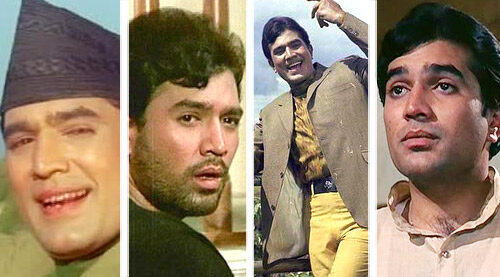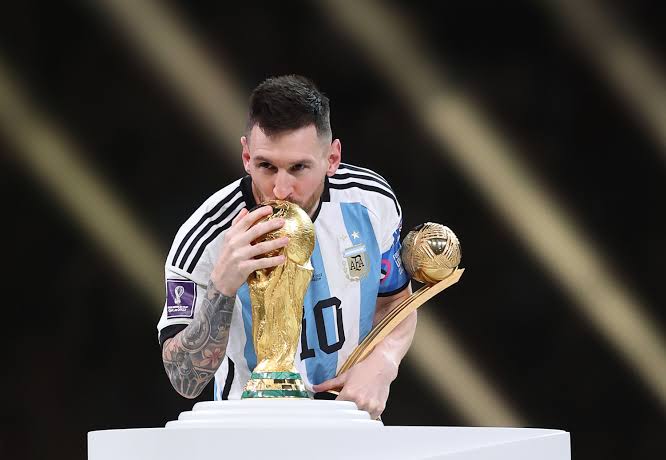
A Flashback of Lionel Messi’s Incredible Journey With Argentina
Lionel Messi finally won the FIFA World Cup and ended Argentina’s 36-year-long wait. But his previous phase with the national team was a different story altogether.
Since his international debut for Argentina 6,332 days ago, Lionel Messi has finally won the FIFA World Cup in Qatar 2022. It was a captain’s performance by the ‘little magician’ throughout the tournament where he guided Argentina to glory and ended the country’s 36-year-long wait for winning the FIFA World Cup since their last triumph in 1986 under the captaincy of the late Diego Maradona.
While Messi was finally able to join an exclusive list of FIFA World Cup-winning captains after featuring in five editions, it was the same prize that once drew all the criticism to him. It even went to the extent of people questioning Messi’s commitment to Argentina.
The FIFA World Cup was the title that also separated Messi from Maradona amongst the Argentine locals when it came to the ‘greatest of all-time’ (GOAT) debate. While Messi’s journey at the club football level has been nothing short of phenomenal, his stint with the Argentina men’s national team was a different story altogether. Here’s a look at Lionel Messi’s journey with the Argentina jersey throughout his career.
2005 FIFA U-20 Men’s World Cup
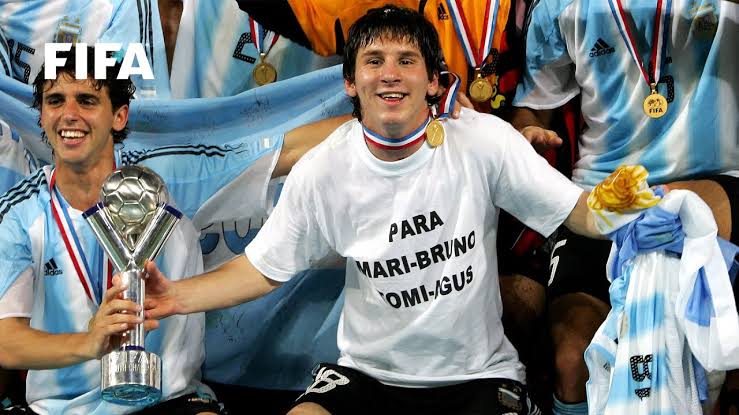
Lionel Messi was brought in as a substitute against Hungary on the Argentine national team on August 17, 2005. By then he had made a name in FC Barcelona, a club that consisted of players like Ronaldinho, Xavi, Iniesta, and Samuel Eto’o. His debut ended on a rather sour note after being sent off within a minute for a direct red card. Despite a rough start to his journey, Messi was selected as the captain for the 2005 FIFA World Youth Championship, also known as the FIFA U-20 Men’s World Cup, held in the Netherlands. It was the first time Messi shone for Argentina, where the 18-year-old powered the national team to win the FIFA U-20 Men’s World Cup.
He ended the tournament as the highest goal scorer with six goals, which also earned him the title of the best player in the tournament. This was the beginning of a glorious career for Lionel Messi with the Argentina national team. He soon earned his call in the Argentina roster for the 2006 FIFA World Cup in Germany.
2006 FIFA World Cup : The Debut
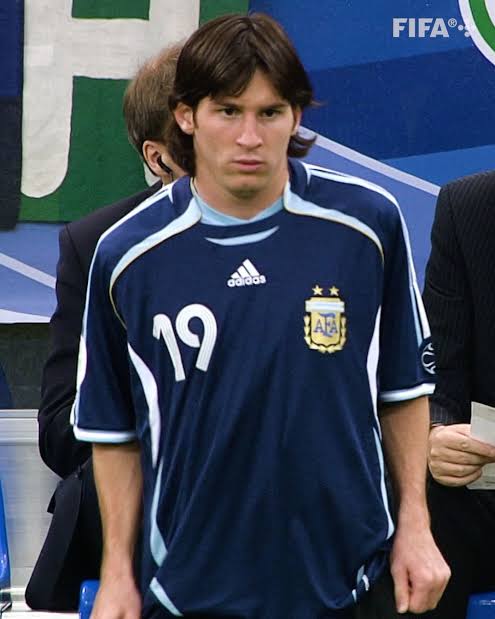
The Firsts Of Many Lionel Messi’s journey on football’s biggest stage began on June 16, 2006 when he was brought in as a substitute against erstwhile Serbia and Montenegro. He played for 16 minutes but was able to provide an assist before ending up scoring his first FIFA World Cup goal.
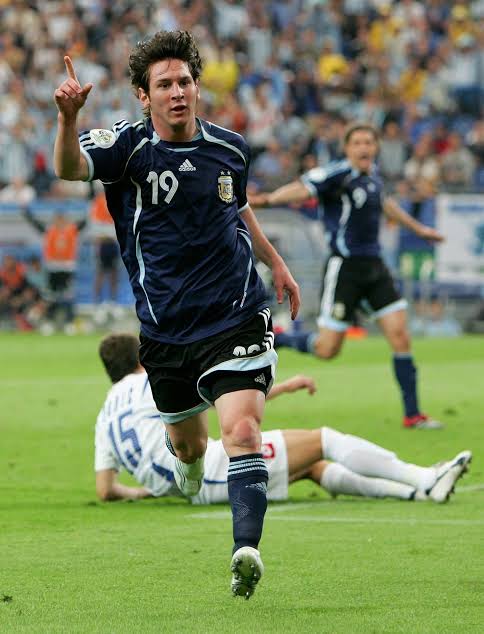
Argentina’s campaign ended in the quarter-finals after losing to hosts Germany in the penalty shootouts at the Olympiastadion in Berlin. Defeats In 2007 Copa América And 2010 FIFA World Cup With the senior national team, Messi had a rough spell throughout various competitions, where Argentina had many near misses after coming close to winning an international trophy. In the 2007 Copa América at Venezuela, Argentina lost 3-0 to Brazil in the finals. But Messi was thriving in FC Barcelona as a vital part of the Pep Guardiola-managed roster that won the historic treble in 2009. Messi was conferred with his first Ballon D’or and the FIFA World Player of the Year award at the age of 22.
He kept on breaking more records with FC Barcelona, but the story was completely different with the Argentina national team. In 2010, Lionel Messi was selected for his second FIFA World Cup in South Africa where Argentina was managed by the late Diego Maradona, the hero of the 1986 World Cup in Mexico.
But Messi’s FIFA Best Player and Ballon D’or awards were questioned because of his performance in the 2010 FIFA World Cup where he could not score a single goal with the Jabulani. Argentina’s campaign was brought to an end in the quarter-finals by Germany yet again. The Diego Maradona-coached squad lost 4-0 and were knocked out of the tournament.
Defeats In 2011 Copa América And 2014 FIFA World Cup
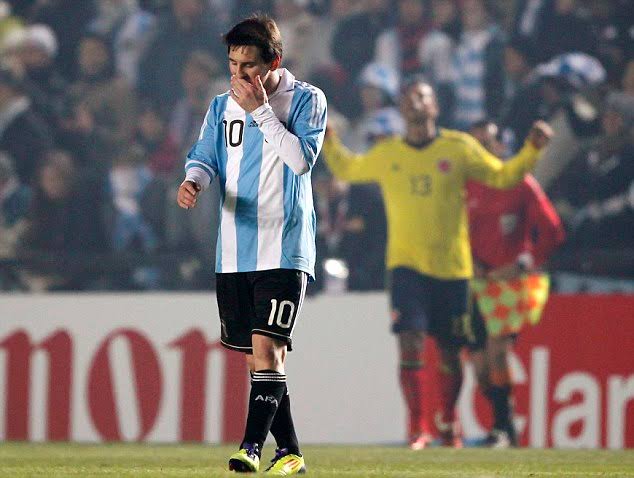
Despite his rough spell with the Argentina national squad, Messi was able to add two more Ballon D’or awards to his list of personal accolades. But Messi had another chance to win an international trophy; This time in their own backyard when Argentina hosted the 2011 Copa América. Their campaign came to an end in the quarter-finals after Uruguay defeated them 5-4 in the penalty shootout at Santa Fe. Messi failed to score yet again even once in another international competition.
While Messi went on to win a record fourth Ballon D’or in four consecutive years because of his performance with FC Barcelona, feelings regarding his talent were not welcomed with much enthusiasm back home in Argentina because of the losses in national football. With all the achievements and trophies in his cabinet, Messi was still under the shadow of Diego Maradona’s legacy in Argentina. With all the criticism thrown at him, Messi’s chance for redemption and international glory came in the 2014 FIFA World Cup in Brazil where he was announced as the captain of Argentina.
He scored four goals and guided Argentina to the finals of a FIFA World Cup for the first time since 1990. But Germany came back to haunt Messi yet again, beating Argentina 1-0 to win the 2014 FIFA World Cup. Messi was awarded the Golden Ball award for being the best player in the tournament. But his quest for international glory continued. Consecutive Defeats In Copa América Finals And Retirement Lionel Messi and Argentina’s international trophy drought continued after the 2014 World Cup finals, losing two consecutive finals to Chile in the 2015 and 2016 Copa América.
Chile hosted the tournament in 2015 where La Roja won their first-ever Copa América title after beating Lionel Messi and Argentina in the finals on penalties. They went on beat Argentina yet again, this time in the United States. The 100th edition of the Copa América (also known as Copa América Centenario) saw a repeat of the 2015 finals where defending champions Chile defeated Argentina yet again on penalties.
This time, Messi missed Argentina’s first penalty from the spot and was left teary-eyed after Chile beat them 4-2 and lifted the special Golden trophy. Messi later announced his retirement from the Argentina national team after losing three major finals in a span of three years.
Messi’s decision also threw light on Argentina’s treatment towards their star player, where they went to the extent of calling him more of a ‘Spaniard’ than Argentine. CNN quoted sports journalist Santi Bauzá, who said, “There was a time in which there was a group of people here in Argentina that thought Messi was probably not fit to wear the shirt of the national team because they felt he was not Argentine enough.” From Buenos Aires to Rosario and Cordoba, fans took to the streets and pleaded with Messi to not leave the national team.
Messi ultimately made the comeback within a few months. talkSPORT quoted him saying, “Many things went through my head the day of the last final and I seriously thought of leaving, but I love this country and this shirt too much. I’m grateful to all the people who wanted me to continue playing with Argentina, hopefully, we can give them something to cheer about soon.”
Loss In 2018 FIFA World Cup And 2019 Copa América
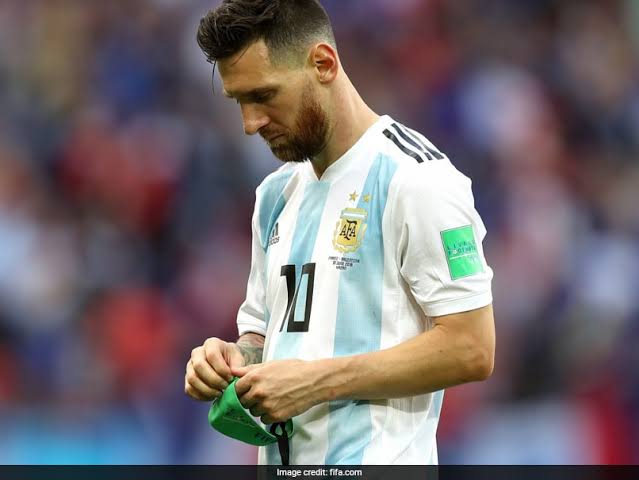
Ahead of the 2018 FIFA World Cup Messi received a four-match ban in the World Cup qualifiers that saw Argentina on the verge of failing to qualify for the 2018 edition. Argentina required a victory against Ecuador, a team they could not beat in the last 16 years, to stay in the qualification race. Messi stepped up with a crucial hattrick that confirmed Argentina’s qualification to the 2018 FIFA World Cup in Russia.
The 2020 Copa América triumph was followed by the 2022 Finalissima (also known as the CONMEBOL-UEFA Cup of Champions), where Argentina faced European champions Italy at Wembley Stadium on June 1, 2022. Messi led Argentina to beat the Roberto Mancini-coached Azzuri side 3-0 to lift the Cup of Champions. The victory also helped Argentina rise up in the FIFA men’s ranking with the Albiceleste becoming one of the favourites to win the 2022 FIFA World Cup.
The 2022 FIFA World Cup
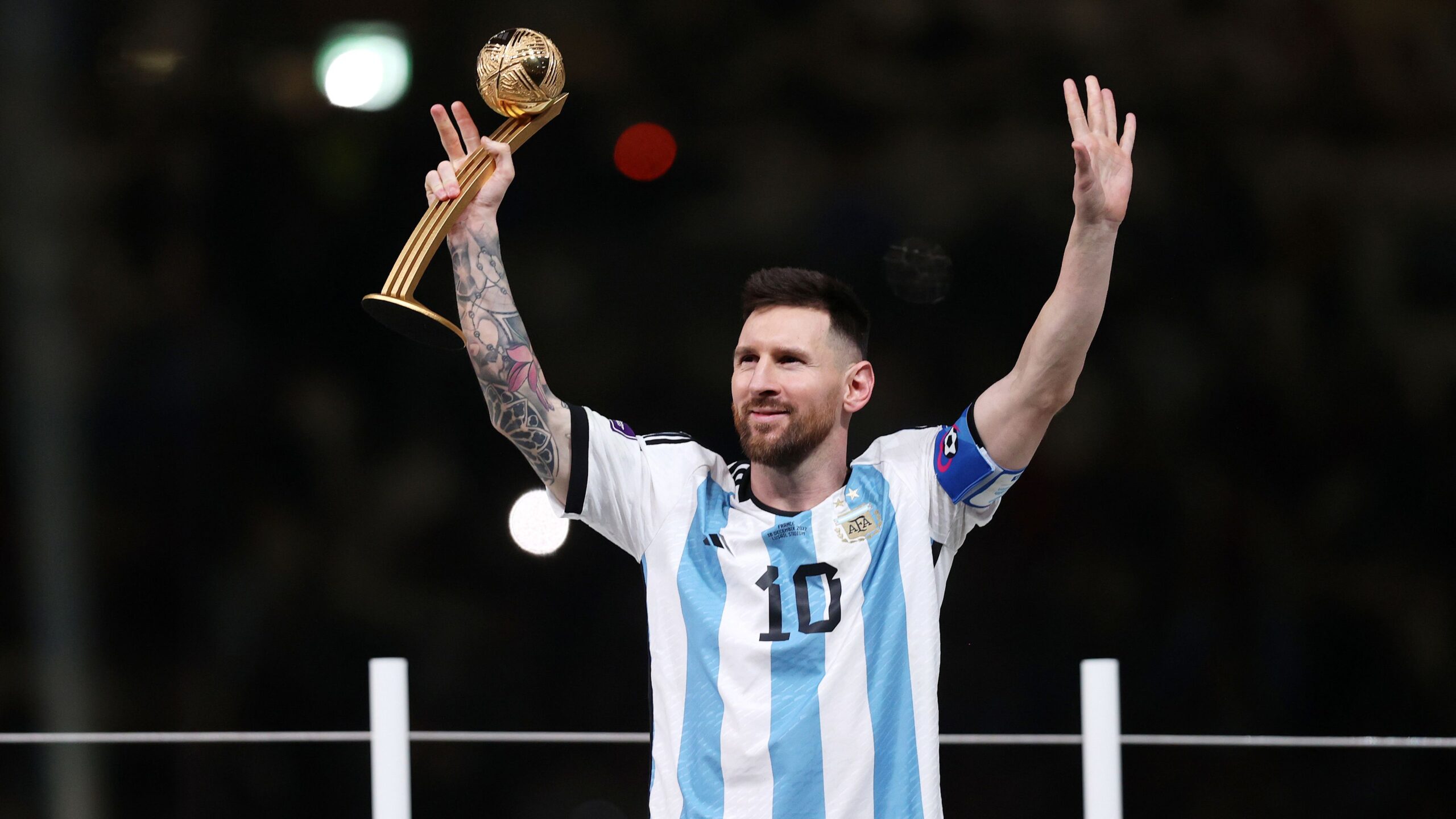
Messi announced that the 2022 edition of the FIFA World Cup would be his last considering his age in the next edition that will be held in the United States, Canada and Mexico in 2026. Argentina started the tournament with a 36-game unbeaten streak but they lost to Saudi Arabia 2-1 in their opening match. From there, Messi led Argentina to another final where they faced defending champions France. Messi scored two goals in 120 minutes of the final but Argentina-France finished it 3-3 after the end of stoppage time. Messi scored in the penalty shootout and witnessed Argentina beat France 4-2 on penalties to win the FIFA World Cup 2022.

Messi broke various records during the 2022 FIFA World Cup campaign. He became the first player in FIFA World Cup history to win the Golden Ball award twice for being the best player in the tournament.





